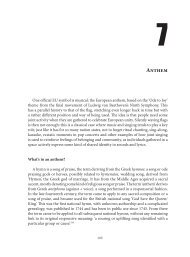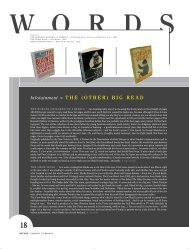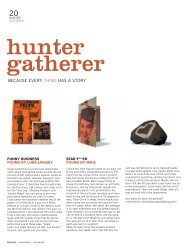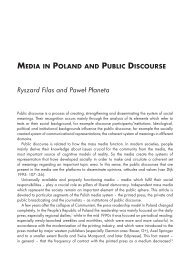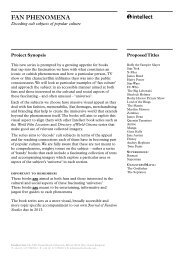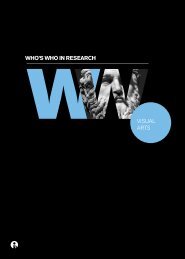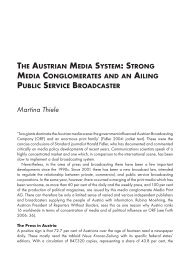Andrea Czepek, Melanie Hellwig and Eva Nowak - Intellect
Andrea Czepek, Melanie Hellwig and Eva Nowak - Intellect
Andrea Czepek, Melanie Hellwig and Eva Nowak - Intellect
You also want an ePaper? Increase the reach of your titles
YUMPU automatically turns print PDFs into web optimized ePapers that Google loves.
234 | PRESS FREEDOM AND PLURALISM IN EUROPE<br />
2008; spiegel online 2008; zdf heute.de 2008). At the time this chapter was written, the cases<br />
were still pending. This case is especially worrisome because, since January 2008, Telekom has<br />
been officially ordered by the German government to store all telecommunications data (e-mail,<br />
telephone, mobile phone connections) for six months for potential criminal investigations. 2<br />
With regard to press freedom, there are concerns that the current laws regarding disclosure<br />
of secrets <strong>and</strong> treason <strong>and</strong> security <strong>and</strong> surveillance have increasingly been used by authorities<br />
to hinder investigative <strong>and</strong> critical reporting. In addition, there has been illegal abuse of modern<br />
technologies to observe journalists <strong>and</strong> their sources, by both the state secret service <strong>and</strong> private<br />
companies. Mainly, the protection of sources has been made more difficult <strong>and</strong> thus the chances<br />
of finding out about grievances have been reduced. In this context, it may appear worrisome<br />
that the German federal ministers agreed in June 2008 on a law to allow the police to search<br />
computers online without the ‘target’ knowing (tagesschau.de 2008; Decker 2008). 3<br />
These decisions raise fears that, despite its being guaranteed in the constitution, press<br />
freedom is endangered by the political situation <strong>and</strong> economic interests. A lively public debate<br />
on this topic, however, shows that press freedom is a highly regarded value in Germany. This<br />
was not always the case, as the development of broadcasting in Germany shows.<br />
Economic structures<br />
The dual broadcasting system: Public service in the age of marketization<br />
Broadcasting in the aftermath of World War II<br />
The German broadcasting system has been shaped until today by the decisions of the Allied<br />
Forces in post-war Germany as a reaction to the Nazi experience. The idea of state distance<br />
<strong>and</strong> support of pluralism regarding ownership as well as content have been influencing German<br />
media policy until today.<br />
When Germany capitulated in 1945 <strong>and</strong> the Allied Forces had taken over power, they made<br />
a clear cut in the German media system. The Allies took over all media <strong>and</strong> only journalists<br />
who were not suspect regarding National Socialism were allowed to publish under the Allies’<br />
censorship. During the first years after World War II, radio played a special role as this was<br />
the easiest way for the Allies to disseminate information <strong>and</strong> anti-Nazi re-education during the<br />
occupation. Paper was not always available <strong>and</strong> the distribution of newspapers was a great<br />
problem in destroyed Germany. But there were ‘Volksempfänger’ in many German households,<br />
the relatively cheap radio receivers with a low range of frequencies which Goebbels’ Nazi<br />
propag<strong>and</strong>a officials had implemented to agitate Germans, especially during the war. The<br />
Nazis had treated as treason the listening to foreign radio stations like the BBC World Service<br />
in order to increase the efficiency of their radio propag<strong>and</strong>a <strong>and</strong> lies about the situation at<br />
the war front.<br />
After this experience, the victorious powers in the three western zones decided to restructure<br />
the German broadcasting (= radio) system in a way that guaranteed decentralization <strong>and</strong><br />
freedom of direct state influence. This was, of course, different in the Soviet zone, where<br />
broadcasting was also denazified, but where the state kept broadcasting centralized <strong>and</strong><br />
exerted direct influence. In the western zones, the US-Army founded Radio Frankfurt, Radio<br />
Stuttgart, Radio München <strong>and</strong> Radio Bremen in their sector, the French founded Südwestfunk<br />
in Baden-Baden <strong>and</strong> the British the Nordwestdeutscher Rundfunk in Hamburg <strong>and</strong> Cologne



